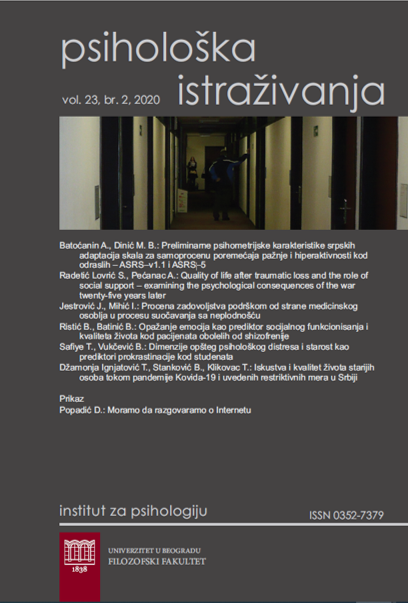Kvalitet života nakon traumatskog gubitka i uloga socijalne podrške – ispitivanje psiholoških posljedica rata dvadeset pet godina poslije
Quality of life after traumatic loss and the role of social support – examining the psychological consequences of the war twenty-five years later
Author(s): Sanja Radetić Lovrić, Aleksandra PećanacSubject(s): Psychology
Published by: Филозофски факултет, Универзитет у Београду
Keywords: traumatic loss; quality of life; social support; missing persons;
Summary/Abstract: The research was conducted with the aim of understanding the farreaching psychological consequences of the war that took place in the territory of former Yugoslavia (1991–1995). The study examines the relationships between wartime traumatic experience of loss, the quality of life and mental health, and therole of social support across three categories of respondents: the first consisting of the respondents who had lost a close family member in the war and whose remains have not been found to date; the second category consisting of the persons who had lost a close family member in the war, and the third category including the respondents who participated in the war socialization but did not experience the loss of a close family member in the war. The survey used the Psychosomatic symptoms lists, the Depression Symptoms Questionnaire, the Subjective Happiness Scale, the Life Satisfaction Scale, and the Social Support Significance Assessment Scale. The results show that the respondents who continue to search for the body of a missing family member have a lower quality of life than the other two categories of respondents, as well as a more pronounced presence of depressive and psychosomatic symptoms. The role of social support in the trauma recovery process remains unclear. The results of the study are discussed in relation to completed and prolonged traumatic loss, and point to further research into the complex emotional dynamics as a consequence of war socialization and the importance of professionalpsychological support.
Journal: Psihološka istraživanja
- Issue Year: 23/2020
- Issue No: 2
- Page Range: 121-140
- Page Count: 20
- Language: English

